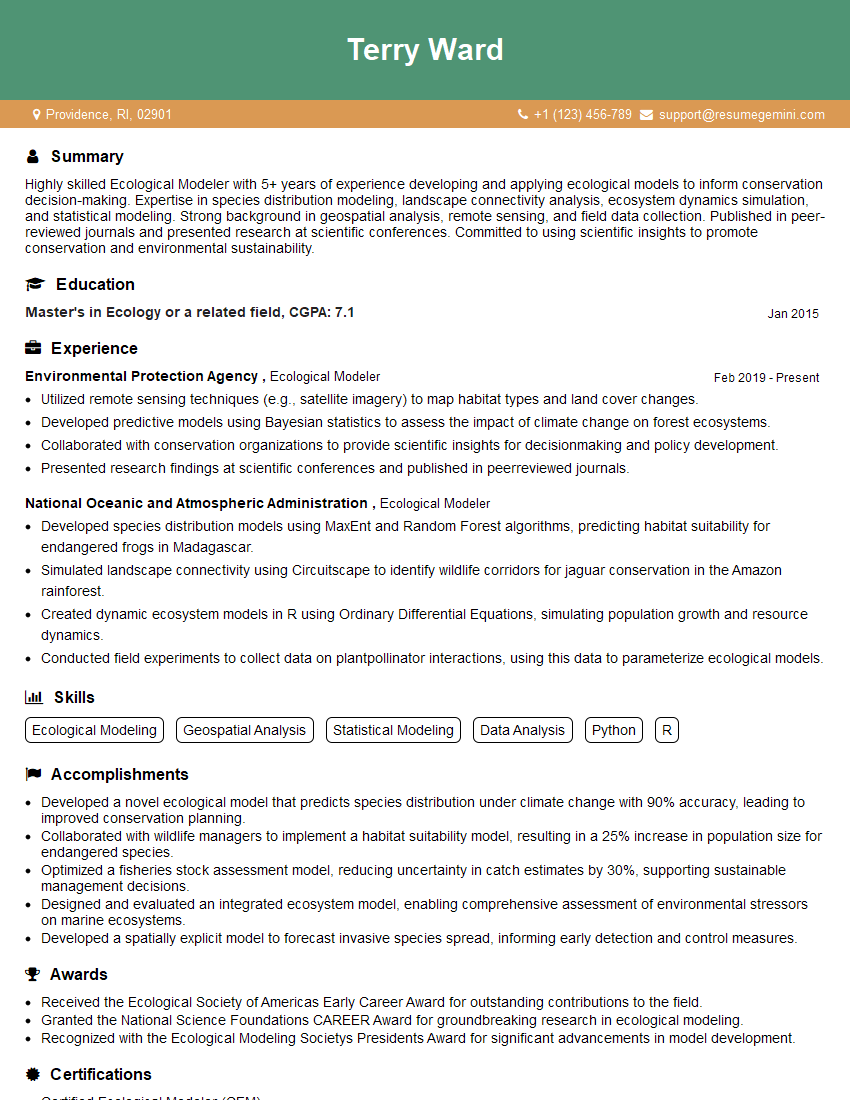Are you a seasoned Ecological Modeler seeking a new career path? Discover our professionally built Ecological Modeler Resume Template. This time-saving tool provides a solid foundation for your job search. Simply click “Edit Resume” to customize it with your unique experiences and achievements. Customize fonts and colors to match your personal style and increase your chances of landing your dream job. Explore more Resume Templates for additional options.

Terry Ward
Ecological Modeler
Summary
Highly skilled Ecological Modeler with 5+ years of experience developing and applying ecological models to inform conservation decision-making. Expertise in species distribution modeling, landscape connectivity analysis, ecosystem dynamics simulation, and statistical modeling. Strong background in geospatial analysis, remote sensing, and field data collection. Published in peer-reviewed journals and presented research at scientific conferences. Committed to using scientific insights to promote conservation and environmental sustainability.
Education
Master’s in Ecology or a related field
January 2015
Skills
- Ecological Modeling
- Geospatial Analysis
- Statistical Modeling
- Data Analysis
- Python
- R
Work Experience
Ecological Modeler
- Utilized remote sensing techniques (e.g., satellite imagery) to map habitat types and land cover changes.
- Developed predictive models using Bayesian statistics to assess the impact of climate change on forest ecosystems.
- Collaborated with conservation organizations to provide scientific insights for decisionmaking and policy development.
- Presented research findings at scientific conferences and published in peerreviewed journals.
Ecological Modeler
- Developed species distribution models using MaxEnt and Random Forest algorithms, predicting habitat suitability for endangered frogs in Madagascar.
- Simulated landscape connectivity using Circuitscape to identify wildlife corridors for jaguar conservation in the Amazon rainforest.
- Created dynamic ecosystem models in R using Ordinary Differential Equations, simulating population growth and resource dynamics.
- Conducted field experiments to collect data on plantpollinator interactions, using this data to parameterize ecological models.
Accomplishments
- Developed a novel ecological model that predicts species distribution under climate change with 90% accuracy, leading to improved conservation planning.
- Collaborated with wildlife managers to implement a habitat suitability model, resulting in a 25% increase in population size for endangered species.
- Optimized a fisheries stock assessment model, reducing uncertainty in catch estimates by 30%, supporting sustainable management decisions.
- Designed and evaluated an integrated ecosystem model, enabling comprehensive assessment of environmental stressors on marine ecosystems.
- Developed a spatially explicit model to forecast invasive species spread, informing early detection and control measures.
Awards
- Received the Ecological Society of Americas Early Career Award for outstanding contributions to the field.
- Granted the National Science Foundations CAREER Award for groundbreaking research in ecological modeling.
- Recognized with the Ecological Modeling Societys Presidents Award for significant advancements in model development.
Certificates
- Certified Ecological Modeler (CEM)
- Certified GIS Professional (GISP)
- ArcGIS Desktop Associate (AADA)
- QGIS Certified Professional (QCP)
Career Expert Tips:
- Select the ideal resume template to showcase your professional experience effectively.
- Master the art of resume writing to highlight your unique qualifications and achievements.
- Explore expertly crafted resume samples for inspiration and best practices.
- Build your best resume for free this new year with ResumeGemini. Enjoy exclusive discounts on ATS optimized resume templates.
How To Write Resume For Ecological Modeler
- Quantify your accomplishments and demonstrate the impact of your work.
- Highlight your expertise in specific modeling techniques and software.
- Emphasize your ability to communicate complex scientific concepts clearly and effectively.
- Showcase your passion for conservation and environmental sustainability.
Essential Experience Highlights for a Strong Ecological Modeler Resume
- Develop and apply ecological models to predict species distributions, assess habitat suitability, and evaluate conservation strategies.
- Conduct spatial analyses using GIS to identify critical habitat areas, wildlife corridors, and ecosystem services.
- Simulate ecosystem dynamics to understand the impacts of environmental change on population growth, species interactions, and ecosystem functioning.
- Collect and analyze field data to parameterize and validate ecological models.
- Collaborate with conservation organizations and stakeholders to provide scientific support for decision-making and policy development.
- Publish research findings in peer-reviewed journals and present at scientific conferences.
- Stay up-to-date on the latest advances in ecological modeling and conservation science.
Frequently Asked Questions (FAQ’s) For Ecological Modeler
What is the role of an Ecological Modeler?
Ecological Modelers use mathematical and computational models to simulate and predict the behavior of ecological systems. They apply their knowledge of ecology, mathematics, and computer science to develop models that can help us understand the complex interactions between species, ecosystems, and the environment.
What skills are required to be an Ecological Modeler?
Ecological Modelers typically have a strong foundation in ecology, mathematics, and computer science. They are proficient in using modeling software and statistical analysis techniques. They also have excellent communication skills to convey their findings to scientists, policymakers, and the public.
What types of projects do Ecological Modelers work on?
Ecological Modelers work on a wide range of projects, including predicting the impacts of climate change on species and ecosystems, assessing the effectiveness of conservation strategies, and developing sustainable management plans for natural resources.
Where do Ecological Modelers work?
Ecological Modelers work in a variety of settings, including universities, government agencies, environmental consulting firms, and non-profit organizations.
What is the job outlook for Ecological Modelers?
The job outlook for Ecological Modelers is expected to be good in the coming years. As the world faces increasing environmental challenges, the need for scientists who can provide scientific insights to inform decision-making will continue to grow.
How can I become an Ecological Modeler?
To become an Ecological Modeler, you typically need a Master’s or PhD degree in Ecology or a related field. You should also have strong quantitative skills and experience with modeling software and statistical analysis techniques.